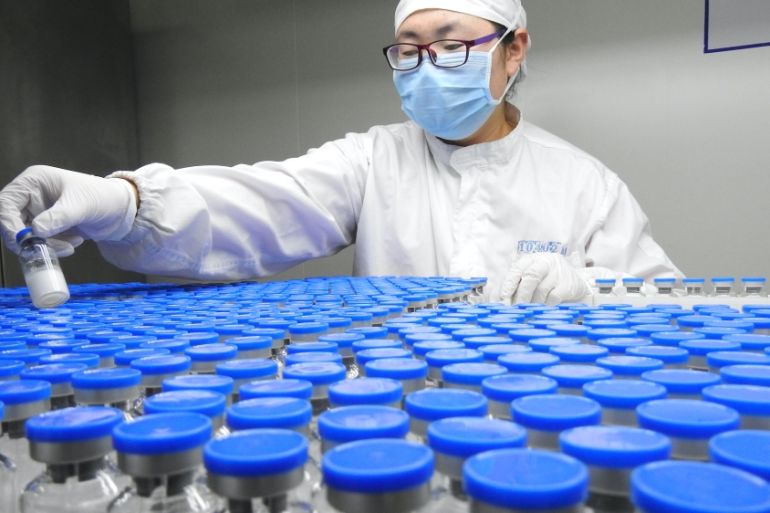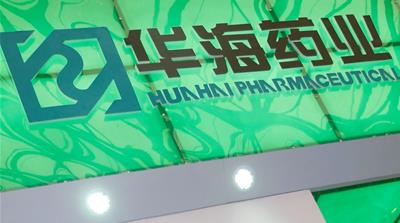Could China’s coronavirus outbreak hurt the global drug industry?
China, epicentre of the outbreak, is the world’s dominant maker of the building blocks of some of the most common drugs.

Beijing, China – “When you control the supply of medicines, you control the world.”
Those were the words of Rosemary Gibson, co-author of the book, China Rx: Exposing the Risks of America’s Dependence on China for Medicine, at a United States Congressional committee hearing last July in Washington, DC.
Keep reading
list of 4 itemsFirst pig kidney in a human: Is this the future of transplants?
Why are some countries decriminalising drugs?
‘No good evidence’ for gender care for youth over long-term, review finds
At that session of the US-China Economic and Security Review Commission, Gibson, who is also a senior adviser to the Hastings Center, a US-based bioethics research institute, laid out her concerns about what she described as “a really hidden and overlooked threat to our national health security, economic prosperity, and national security, and that is our dependence on China for medicine.”
The US Food and Drug Administration has contacted producers of about 20 drugs that either source all of their main ingredients from or are finished in China to gauge if they will face shortages due to the coronavirus outbreak.
Around 88 percent of the active pharmaceutical ingredients used in drugs for the US market were manufactured overseas in 2018, according to the FDA
China‘s attempts to limit the spread of a deadly viral outbreak have crippled factories that produce everything from cars and electronics to clothes and greetings cards. That, in turn, has reminded the rest of the world just how dependent it is on China as a source of components and finished products.
The impact of the coronavirus epidemic on companies ranging from chipmaker Foxconn to car firms such as Tesla and Hyundai has been the subject of intense scrutiny. But China’s pivotal role in the pharmaceutical industry – in particular the manufacture of cheaper generic drugs that have lost their patents – has largely gone unnoticed.
Its dominance of that segment of the industry is largely due to its commanding position in the production and export of so-called active pharmaceutical ingredients (APIs). These are the chemical building blocks for many crucial drugs, including penicillin, the painkiller ibuprofen and the popular diabetes drug acarbose.
Just how dominant it is, is a subject of some uncertainty because there is no reliable global register of APIs, according to an August report by Yanzhong Huang, a senior fellow for global health at the Council on Foreign Relations (CFR) in Washington, DC.
A big slice of the API pie
The World Health Organization reckons that China accounts for 20 percent of the global output of APIs. The United Kingdom’s Medicines and Healthcare products Regulatory Agency estimates the figure to be double that.
And that is a significant slice of a large and growing market. Various industry research firms have estimated the global size of the API market to be between $155bn and nearly $200bn, with annual growth rates ranging between six percent and seven percent.

China’s API industry has been growing at around double the global average rate. It generated more than $71bn in revenues in 2018, up 14.7 percent year-on-year, and exports have been growing by 14 percent annually recently, according to data from the China Chamber of Commerce for Import & Export of Medicines & Health Products.
Zhejiang Hisun is one of the largest API exporters in China, selling more than 130 kinds of APIs used in antibiotics and medicines that treat cancer and cardiovascular diseases.
“We export to over 70 countries and territories in North America, Europe, Latin America and Asia. Two big clients we supply our APIs to are Merck and Bayer,” Xingxing Du, an API salesperson at Zhejiang Hisun Pharmaceutical, told Al Jazeera.
A staffer at Hisun, who declined to be identified, did not give details of the company’s API production amid the viral outbreak, but said the company has resumed operations. Zhejiang Province, where the company is located, has one of the highest numbers of confirmed cases after Hubei Province, the site of the virus’s epicentre, the city of Wuhan.
Commissioned by China’s Ministry of Commerce, The China Chamber of Commerce for Import & Export of Medicines & Health Products is conducting a survey to examine the effect of the outbreak on China’s drug exports. But a representative of the chamber named Xu told Al Jazeera by email that the results of that survey will not be made public.
Basic treatments most at risk
Jayasree Iyer, executive director at the Access to Medicine Foundation, a non-profit organisation that analyses the world’s largest pharmaceutical companies, says it would be very difficult for a foreign buyer to replace Chinese API supplies in the event of a disruption – at least not quickly.
What’s more, research by Iyer’s foundation suggests that patients are typically given inferior drugs during shortages.
“The trade between China and any country in the world could limit the number of any final products that are actually produced anywhere in the world,” Iyer told Al Jazeera. “Patients who receive antibiotics for basic infections and the older cancer chemotherapies would be the most affected.”
The disruptions caused by the coronavirus – both current and potential – highlight the fears among many observers of China’s stranglehold on the market for basic drugs.
Would the world rely on China for 80 percent of the global supply of oil or food commodities such as wheat? Of course not.
According to a survey conducted by Swiss global trade network Kemiex, around 85 percent of pharmaceutical industry buyers, traders and producers expect supply chain disruptions and more than a third see the outbreak having a large effect on the supply of APIs. The disruptions to production could affect deliveries in the second quarter of this year, the survey shows.
“China’s control over APIs and the raw materials and chemical intermediates to make them is dramatic,” author and healthcare expert Gibson told Al Jazeera. “We’re talking about life-saving antibiotics and medicines used for surgery.”
“Countries need to start considering medicines and the key ingredients to make them as a strategic asset necessary for the day-to-day life of a country,” she said. “Would the world rely on China for 80 percent of the global supply of oil or food commodities such as wheat? Of course not.”
In her testimony to Congress, Gibson highlighted the fact that the US has lost much of its ability to produce basic drugs. For example, the last manufacturing plant to make penicillin in the US closed down in 2004.
Even India, the largest manufacturer of generic drugs, could be vulnerable to supply shortages of APIs from China.
Indian generics makers like Cipla built a large pharmaceuticals industry that was instrumental in lowering the cost of HIV drugs around the world. In the process, India became the single biggest importer of Chinese APIs. Indian generic drugs manufacturers depend on China for 80 percent of their APIs and chemical intermediates, Gibson said.
Quality control
But even before the latest viral outbreak, health regulators both at home and abroad have been concerned about China-made pharmaceuticals.
In 2018, the European Union raised the alarm over valsartan, the active ingredient in medicines used to treat high blood pressure and reduce complications such as heart attack and stroke.
The European Medicines Agency said it was reviewing drugs containing the ingredient made by a Chinese firm, Zhejiang Huahai Pharmaceuticals, because the regulator had detected traces of an impurity, N-nitrosodimethylamine (NDMA), classified as a probable cancer-causing substance.

That was after the US Food and Drug Administration sent the company a warning letter, also because it had found NDMA in the company’s product.
Zhejiang Huahai said in a December 2018 statement that it is “taking every step to ensure [its] products remain safe, therapeutically effective, and meet the highest standards.”
But China’s pharmaceutical industry suffered a big blow to its reputation among overseas buyers following that incident.
It has also been on the receiving end of public anger at home following cases of tainted medicines.
Also in 2018, Chinese regulators halted production of a rabies vaccine made by Changchun Changsheng Life Sciences Ltd after finding fabricated records and other problems during an inspection.
Premier Li Keqiang slammed the company for having crossed a moral red line and called for swift action.
“We will resolutely crack down on illegal and criminal acts that endanger the safety of peoples’ lives, resolutely punish lawbreakers according to the law, and resolutely and severely criticise dereliction of duty in supervision,” Li said in a statement.
These cases occurred despite government measures to improve quality.
In 2016, China put in place revised good manufacturing practice guidelines to meet international standards.
Many manufacturers of APIs in China have since been inspected by European and US authorities and have demonstrated compliance with international standards for production in compliance, Scott Wheelwright, cofounder of China-based pharmaceutical consultancy firm Complya Asia, told Al Jazeera.
The CFR’s Huang estimates that the measures implemented in 2016 could result in roughly half of China’s 2,900 small and “often low-quality” domestic drugmakers closing shop.
But even with the highest safety standards, China’s surviving drug firms are now facing yet another crisis that could test their resilience, as the coronavirus stalks the country.